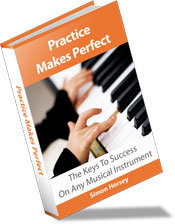Is scales practice really important?
YES!
Love them or loathe them there's no getting away from them. Scales practice is important... but not only for the reasons you may think! Practicing scales helps us think in a certain key. When we are sight reading or just starting to learn a new piece it is much easier to focus on the notes (and get them correct) if we know the piece is in Ab major and everything that entails, instead of trying to remember Bb, Eb, Ab, Db, Bb, Eb, Ab, Db and either forgetting some of them or constantly repeating the flats or sharps in our heads - which is rather distracting! Scales practice also help us hear tonalities, that is hearing what key a piece of music is in. This helps internalize music later on and also helps with memorization. It is much easier to memorize a piece when we are aware of which key each section is in and where it is likely to move next. All scales are related in one way or another.
Scale practice does not directly make playing pieces better. Scales practice makes your scales better. Practicing pieces makes those pieces better. Having said that scales practice does improves playing and therefore it does help your pieces in the long run. And practicing scales can be fun - in a challenging kind of way.
Scales played in the correct musical way
are very exciting and rewarding
James Galway - Flautist
Before you can practice scales you have to learn them of course!
Click here for tips on learning scales
What have scales ever done for me?
Scales help the fluency of your playing, your sight reading, improvisation, composition and aural (listening abilities) as well as being useful for practicing techniques on your instrument. Scale practice helps you hear different keys and tonalities and identify patterns within music. Scales you know well also give you the opportunity to practice techniques without having to think about notes. E.g. Playing a scale you know very well staccato means you can work on your staccato technique without worrying about the notes or fingerings. You focus on your staccato. Playing a scale pianissimo enables you to concentrate on making every note sound evenly when playing very soft. Scales practice can be used for much more than just practicing scales!
Click here for more ideas on scale practice.
For more information on how to learn scales easily, read my book Practice Makes Perfect. It tells you how to practice in an easy to understand format. Click here for more information on Practice Makes Perfect.
And click here to read my review of the Scalebox App for iOS and Android
Key Thinking
Knowing your scales also helps you to think in a certain key. This is essential when sight reading. It means instead of thinking "B flat - E flat - A flat - D flat - B flat - E flat - A flat - D flat - B flat..." all the way through you can just think "A flat major" leaving your mind free to concentrate on the notes, timing, phrasing and all the other things you need to think about when sight reading. Thinking in a key also helps you learn pieces faster, especially if you are aware of the related keys it could move to.
Expert Practice Secrets
Frustrated with your practice? Read Practice Makes Perfect and hack the 10,000 hour rule. Cut your practice time by up to 25%! Make faster progress, learn pieces and scales faster, memorize more easily, and much more. "If you play an instrument you need this book!"
Recent Articles
-
Curdridge Parking
Jul 10, 25 06:11 PM
-
How To Speed Up Scales and Improve Accuracy
Oct 13, 24 04:23 AM
How to speed up scales is something many people want to know, but speed should also come with accuracy. Read on to find out how to do both. -
From an opera singer, on her death bed to Leonard Bernstein
Jan 29, 24 03:36 PM
I enjoy reading the music more than hearing it. From an opera singer, on her death bed to Leonard Bernstein

New! Comments
Have your say about what you've just read!Leave me a comment in the box below.